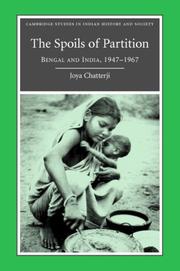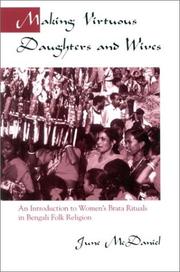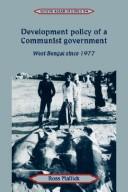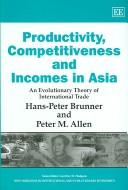| Listing 1 - 8 of 8 |
Sort by
|

ISBN: 9780511497384 9780521875363 9780521188067 9780511378966 0511378963 0511497385 0521875366 0521188067 9780511376252 0511376251 9780511374722 0511374720 1107182107 1281243507 9786611243500 0511378076 0511377193 9781107182103 9781281243508 661124350X 9780511378072 9780511377198 Year: 2007 Publisher: Cambridge New York Cambridge University Press
Abstract | Keywords | Export | Availability | Bookmark
 Loading...
Loading...Choose an application
- Reference Manager
- EndNote
- RefWorks (Direct export to RefWorks)
The partition of India in 1947 was a seminal event of the twentieth century. Much has been written about the Punjab and the creation of West Pakistan; by contrast, little is known about the partition of Bengal. This remarkable book by an acknowledged expert on the subject assesses the social, economic and political consequences of partition. Using compelling sources, the book, which was originally published in 2007, shows how and why the borders were redrawn, how the creation of new nation states led to unprecedented upheavals, massive shifts in population and wholly unexpected transformations of the political landscape in both Bengal and India. The book also reveals how the spoils of partition, which the Congress in Bengal had expected from the new boundaries, were squandered over the twenty years which followed. This is an intriguing and challenging work whose findings change our understanding and its consequences for the history of the subcontinent.
West Bengal (India) --- Bengal (India) --- India --- History. --- History --- Paścima Baṅgāla (India) --- Paścimabaṅga (India) --- Paschimbanga (India) --- Pashchim Bengal (India) --- Arts and Humanities

ISBN: 0791487652 1417508604 9781417508600 0791455653 9780791455654 0791455661 9780791455661 9780791487655 Year: 2003 Publisher: New York : State University of New York Press,
Abstract | Keywords | Export | Availability | Bookmark
 Loading...
Loading...Choose an application
- Reference Manager
- EndNote
- RefWorks (Direct export to RefWorks)
Exploring the folk religion of India and the role of girls and women within it, author June McDaniel focuses on the brata (vrata) ritual in which moral lessons are taught and goddesses are revealed. Bratas are performed to gain such goals as a healthy family, a good husband, and a happy life. They are also performed so that the performers (bratinis) develop such virtues as devotion, humility, and compassion.This book presents data from fieldwork, along with brata stories, songs, poems, and ritual activities. It discusses Bengali folk religion, offers an example of ritual worship in folk Hinduism, and surveys a variety of bratas. The author analyzes the similarities and differences among these rituals in low-caste village life and in high-caste Hindu tradition, and notes that the development of these rituals involves a form of continuing divine revelation with women as the primary transmitters. Bratas act to maintain traditional Hindu values, but also emphasize the power of women, whose virtues can save their husbands from hell worlds and their families from disasters.
Hindu women --- Folklore --- Bengali (South Asian people) --- Hinduism --- Vratas. --- Barats --- Bratas --- Vrata --- Vrats --- Religious life --- Women, Hindu --- Women --- Religious life. --- Rituals. --- Rituals --- West Bengal (India) --- Paścima Baṅgāla (India) --- Paścimabaṅga (India) --- Paschimbanga (India) --- Pashchim Bengal (India) --- Bengal (India) --- Religious life and customs.
Book
ISBN: 8132113292 9788132113294 9781299585096 1299585094 9788132110941 8132110943 Year: 2013 Publisher: Thousand Oaks
Abstract | Keywords | Export | Availability | Bookmark
 Loading...
Loading...Choose an application
- Reference Manager
- EndNote
- RefWorks (Direct export to RefWorks)
In the wake of the enormous interest across the globe in the fall of the Left Front in West Bengal, this book describes the Left era as one of passive revolution: limited reforms and changes, big compromises, corruption of the commissars and the failure of the Left in assessing popular discontent and anger; thus, it is the end of revolution even in passive form. A collection of articles by Samaddar from leading national dailies and journals between 1977 and the downfall of the Left in West Bengal, this books analyses the era of the Left rule, its political decisions and its social
Labor policy --- Labor unions --- Industrial unions --- Labor, Organized --- Labor organizations --- Organized labor --- Trade-unions --- Unions, Labor --- Unions, Trade --- Working-men's associations --- Labor movement --- Societies --- Central labor councils --- Guilds --- Syndicalism --- Labor --- State and labor --- Economic policy --- History. --- Government policy --- West Bengal (India) --- Paścima Baṅgāla (India) --- Paścimabaṅga (India) --- Paschimbanga (India) --- Pashchim Bengal (India) --- Bengal (India) --- Politics and government

ISBN: 0521047854 0511882165 0511558899 0521432928 0521056195 Year: 1993 Volume: 54 Publisher: Cambridge : Cambridge University Press,
Abstract | Keywords | Export | Availability | Bookmark
 Loading...
Loading...Choose an application
- Reference Manager
- EndNote
- RefWorks (Direct export to RefWorks)
West Bengal has the longest-ruling democratically elected Communist government in world history. Since 1977 the Left Front has governed a population of 68 million people and has received considerable world-wide attention as a positive example of Third World development and change. In this book, Dr Ross Mallick convincingly challenges this view of the Left Front government, arguing that it has been a failure in terms of redistributive development reform.
Communism --- Bolshevism --- Communist movements --- Leninism --- Maoism --- Marxism --- Trotskyism --- Collectivism --- Totalitarianism --- Post-communism --- Socialism --- Village communities --- West Bengal (India) --- Paścima Baṅgāla (India) --- Paścimabaṅga (India) --- Paschimbanga (India) --- Pashchim Bengal (India) --- Bengal (India) --- Economic policy. --- Social Sciences --- Political Science
Book
ISBN: 1108577628 1108348556 1108689396 1108425615 1108441092 Year: 2018 Publisher: Cambridge : Cambridge University Press,
Abstract | Keywords | Export | Availability | Bookmark
 Loading...
Loading...Choose an application
- Reference Manager
- EndNote
- RefWorks (Direct export to RefWorks)
This innovative study explores the interface between nation-building and refugee rehabilitation in post-partition India. Relying on archival records and oral histories, Uditi Sen analyses official policy towards Hindu refugees from eastern Pakistan to reveal a pan-Indian governmentality of rehabilitation. This governmentality emerged in the Andaman Islands, where Bengali refugees were recast as pioneering settlers. Not all refugees, however, were willing or able to live up to this top-down vision of productive citizenship. Their reminiscences reveal divergent negotiations of rehabilitation 'from below'. Educated refugees from dominant castes mobilised their social and cultural capital to build urban 'squatters' colonies', while poor Dalit refugees had to perform the role of agricultural pioneers to access aid. Policies of rehabilitation marginalised single and widowed women by treating them as 'permanent liabilities'. These rich case studies dramatically expand our understanding of popular politics and everyday citizenship in post-partition India.
Refugees --- Hindus --- Citizenship --- Birthright citizenship --- Citizenship (International law) --- National citizenship --- Nationality (Citizenship) --- Political science --- Public law --- Allegiance --- Civics --- Domicile --- Political rights --- Hindoos --- Religious adherents --- Displaced persons --- Persons --- Aliens --- Deportees --- Exiles --- History --- Law and legislation --- India --- West Bengal (India) --- Paścima Baṅgāla (India) --- Paścimabaṅga (India) --- Paschimbanga (India) --- Pashchim Bengal (India) --- Bengal (India) --- Influence. --- Politics and government
Book
ISBN: 1009259385 1009259393 1009259423 Year: 2023 Publisher: Cambridge, United Kingdom ; New York, NY : Cambridge University Press,
Abstract | Keywords | Export | Availability | Bookmark
 Loading...
Loading...Choose an application
- Reference Manager
- EndNote
- RefWorks (Direct export to RefWorks)
In recent years, Bengali Muslims in India have faced harassment and scapegoating as the trope of the illegal Bangladeshi has gained political currency. India's Bangladesh Problem explores the experience of Bengali Muslims on the Indian side of the India-Bangladesh border in the context of neoliberal policies, unequal bilateral relations, labor migration, contested citizenship, and increasingly xenophobic government rhetoric. Drawing on extensive research in the borderlands and hinterlands of both countries, Navine Murshid argues that ever-deepening neoliberal policies across the border have shaped how certain ethnic groups are valued and have reconfigured social hierarchies. She provides new insights into the strategic inclusion, exclusion, and invisibility that characterizes Bengali Muslims' lives, rendering them a group susceptible to manipulation by virtue of their ethnic kinship to the majority of Bangladeshis. In turn, Bengali Muslims simultaneously resist and utilize received neoliberal ideas to sustain their lives and livelihoods at a time when neoliberal development has largely bypassed them.
Muslims --- Borderlands --- Border-lands --- Border regions --- Frontiers --- Boundaries --- Mohammedans --- Moors (People) --- Moslems --- Muhammadans --- Musalmans --- Mussalmans --- Mussulmans --- Mussulmen --- Religious adherents --- Islam --- Social conditions. --- West Bengal (India) --- Assam (India) --- Ethnic relations. --- ʻAtsam (India) --- Asama (India) --- Asom (India) --- Eastern Bengal and Assam (India) --- Paścima Baṅgāla (India) --- Paścimabaṅga (India) --- Paschimbanga (India) --- Pashchim Bengal (India) --- Bengal (India)
Book
ISBN: 9781400875252 1400875250 0691622760 9780691622767 Year: 2015 Publisher: Princeton, NJ
Abstract | Keywords | Export | Availability | Bookmark
 Loading...
Loading...Choose an application
- Reference Manager
- EndNote
- RefWorks (Direct export to RefWorks)
Since its independence in 1947, India, as a large, diverse, and rapidly changing country, has had to meet federalizing problems of a magnitude unprecedented in history. The result has been a process that combines, modifies, and transforms many established ideas about federalism. Professor Franda deals with the complexities of India's experience by analyzing the politics of center-state relations as they affect one Indian state. He explores the various ways in which central and state leadership groups in India and West Bengal have developed working relationships, and examines the effect of state and regional political, economic, and social conditions on the evolution of center-state behavior patterns.Originally published in 1968.The Princeton Legacy Library uses the latest print-on-demand technology to again make available previously out-of-print books from the distinguished backlist of Princeton University Press. These editions preserve the original texts of these important books while presenting them in durable paperback and hardcover editions. The goal of the Princeton Legacy Library is to vastly increase access to the rich scholarly heritage found in the thousands of books published by Princeton University Press since its founding in 1905.
Federal government --- Land tenure --- Agrarian tenure --- Feudal tenure --- Freehold --- Land ownership --- Land question --- Landownership --- Tenure of land --- Land use, Rural --- Real property --- Land, Nationalization of --- Landowners --- Serfdom --- Division of powers --- Federal-provincial relations --- Federal-state relations --- Federal systems --- Federalism --- Powers, Division of --- Provincial-federal relations --- State-federal relations --- Political science --- Central-local government relations --- Decentralization in government --- Law and legislation --- Damodar Valley Corporation. --- DVC --- West Bengal (India) --- Paścima Baṅgāla (India) --- Paścimabaṅga (India) --- Paschimbanga (India) --- Pashchim Bengal (India) --- Bengal (India) --- Boundaries.

ISBN: 1843765853 Year: 2005 Publisher: Cheltenham Edward Elgar
Abstract | Keywords | Export | Availability | Bookmark
 Loading...
Loading...Choose an application
- Reference Manager
- EndNote
- RefWorks (Direct export to RefWorks)
Evolutionary economics --- 338.8 --- 382.10 --- ASI / Asia - Azië - Asie --- Economics --- Economische groei --- Theorieën van internationale en interregionale handel: algemeenheden. Comparatieve voordelen --- Nepal --- West Bengal (India) --- Paścima Baṅgāla (India) --- Paścimabaṅga (India) --- Paschimbanga (India) --- Pashchim Bengal (India) --- Bengal (India) --- Nīpāl --- Ni-po-erh --- Nepāḥ --- Nepal Adhirajya --- Kingdom of Nepal --- Nepāla --- Federal Democratic Republic of Nepal --- Sanghiya Loktāntrik Ganatantra Nepāl --- Непал --- Savezna Demokratska Republika Nepal --- República Federal Democràtica del Nepal --- Kongeriget Nepal --- Demokratische Bundesrepublik Nepal --- Νεπάλ --- Nepalo --- Federacia Demokratia Respubliko Nepalo --- República Federal Democrática de Nepal --- Nepali Demokraatlik Liitvabariik --- Nepalgo Errepublika Demokratiko Federala --- Nepalin demokraattinen liittotasavalta --- République démocratique fédérale du Népal --- נפאל --- Sambandslýðveldið Nepal --- ネパール --- Nepāru --- 네팔 --- Nepalia --- Federale Democratische Republiek Nepal --- Nepālas Federālā Demokrātiskā Republika --- Федеративная Демократическая Республика Непал --- Federativnai︠a︡ Demokraticheskai︠a︡ Respublika Nepal --- Савезна Демократска Република Непал --- Республіка Непал --- Respublika Nepal --- Федеративна Демократична Республіка Непал --- Federatyvna Demokratychna Respublika Nepal --- Cộng hòa dân chủ liên bang Nepal --- 尼泊尔 --- Nibo'er --- Commerce --- Econometric models. --- Foreign trade policy --- Asia
| Listing 1 - 8 of 8 |
Sort by
|

 Search
Search Feedback
Feedback About UniCat
About UniCat  Help
Help News
News